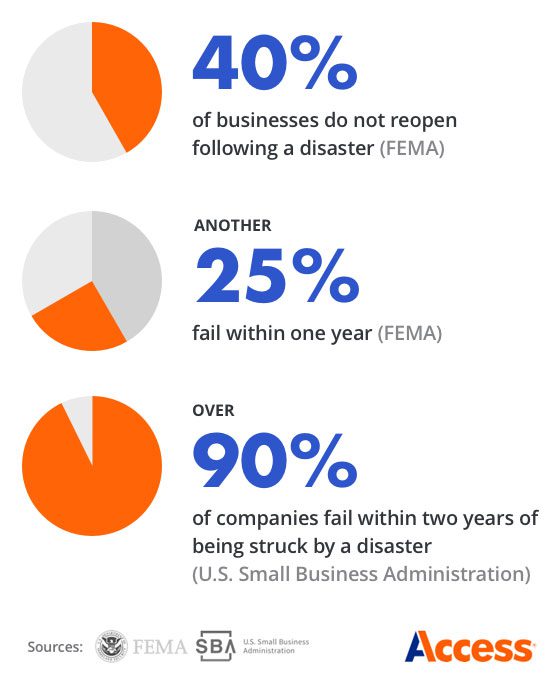Editor’s note: This piece was updated on April 14, 2020 to remain current in light of recent world events.
There’s nothing worse than trying to pick up the pieces following a natural disaster.
We’ve seen too many of them in recent years. Hurricanes Katrina, Harvey, and Irma, Super Storm Sandy, and many more both on and off our shores. Any resident who’s lived through these nightmare scenarios can tell you: The aftermath can be just as nightmarish as the event itself.
Today we face a different kind of disaster – the unexpected and unprecedented global pandemic that is COVID-19 (Coronavirus). And lots of people are experiencing a range of emotions from anxiety, to concern, to downright fear.
Unfortunately, just as people can be negatively impacted by a large-scale, terrible incident, businesses can be affected the same way. While residents are often able to eventually get back to life as normal, many companies are not so lucky.
How Many Businesses Won’t Reopen After Coronavirus?
While we certainly can’t predict the future – particularly in the face of so much uncertainty – we can look to the past for data and insights.
According to a report from the Federal Emergency Management Agency (FEMA), 40% of businesses do not reopen following a disaster. On top of that, another 25% fail within one year.
How Long Will the Damage Last?
If you think that getting past the one year mark means a company is out of the woods, think again. The United States Small Business Administration found that over 90% of companies fail within two years of being struck by a disaster.
That’s an alarming percentage of businesses that fail after a disaster. We certainly hope that given the magnitude and reach of this crisis, we’ll collectively prove them wrong in this case. But facing the situation we are, let’s now talk about how to be one of the survivors—and thrivers.
How To Weather the Proverbial Storm
Government aid and insurance can help businesses stay open during the pandemic and physically get the doors open again in its aftermath. But it can’t help if records and important documents have been lost.
For this, companies need to be proactive with their approach.
“To survive, business owners must prepare for emergencies and take steps to prevent, or minimize, the effect of disasters,” a Chamber 101 report reads.
As the old saying goes, it’s better to be safe than sorry. This is why partnering with a document storage company that specializes in offsite, local and secure management of business records is crucial in proactive disaster planning.
What You Can Do Today
Certainly it’s best to have an emergency preparedness plan before disaster strikes. If you’re looking for solutions today in the wake of the Coronavirus outbreak, here are some things to consider:
Document management companies with advanced capabilities like Scan on Demand and Digital Mailroom help you keep critical information safe. They can also help you receive physical documents in an electronic form when you can’t physically get to them, due to stay at home orders.
Businesses can use this to optimize real estate and increase productivity as a standard best practice anytime. During times of crisis, electronic delivery offers additional layers of support to your business continuity plan.
